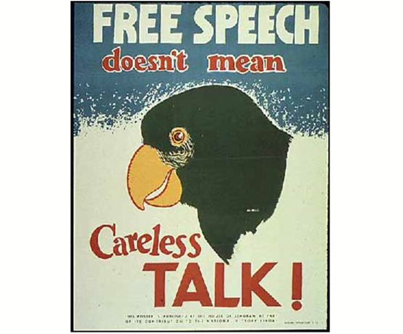Schenck v. the United States was a result of Charles Schenck and Elizabeth Baer distributing pamphlets that critisized the draft During the Great War. They argued that it was unconstitutional as it violated the 13th amendment which prohibited involuntary servitude, however those arguing against the draft thought of mandatory military service as violating this. This was brought to court as it violated the 1917 Espionage Act as it tampered with military participation. This case questioned the Espionage act in terms of the First Amendment, however the espionage act was upheld backed up because of the fact that it was in wartime.

Posters like these were used to encourage restriction of the first amendment in times of national security.

The alien and sedition acts were similar as they limited first amendment rights.

Posters like these were used to encourage restriction of the first amendment in times of national security.

The alien and sedition acts were similar as they limited first amendment rights.
Comments
Post a Comment